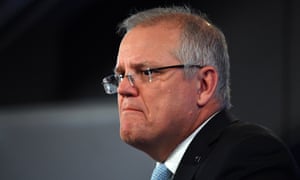Prime minister says industrial relations debate needs to move past ‘black and white discussions’
Scott Morrison
has said the government wants employers and workers to both be better
off but refused to guarantee existing pay and conditions would be
protected by its industrial relations reform consultation.
After Morrison extended an olive branch by dropping union-busting legislation on Tuesday, key faultlines have already emerged with the Australian Council of Trade Unions calling for a focus on the quality of secure work and refusing to back down on the principle no worker should be worse off.
Instead, the ACTU secretary, Sally McManus, has identified the process of bargaining for workplace pay deals, and removing barriers to their approval, as potential improvements.
Despite comparisons to the 1980s Prices and Incomes Accord, the government has already ruled out extending taxpayer supports including the doubling of the jobseeker unemployment benefit and jobkeeper wage subsidy, in return for union cooperation.
On Wednesday, Morrison said that “is not part of the discussions” proposed – which will instead deal with awards, enterprise bargaining, casuals and fixed term employment, compliance and greenfields agreements.
After Morrison extended an olive branch by dropping union-busting legislation on Tuesday, key faultlines have already emerged with the Australian Council of Trade Unions calling for a focus on the quality of secure work and refusing to back down on the principle no worker should be worse off.
Instead, the ACTU secretary, Sally McManus, has identified the process of bargaining for workplace pay deals, and removing barriers to their approval, as potential improvements.
Despite comparisons to the 1980s Prices and Incomes Accord, the government has already ruled out extending taxpayer supports including the doubling of the jobseeker unemployment benefit and jobkeeper wage subsidy, in return for union cooperation.
On Wednesday, Morrison said that “is not part of the discussions” proposed – which will instead deal with awards, enterprise bargaining, casuals and fixed term employment, compliance and greenfields agreements.
“Now we want to focus on what is happening in the workplace itself and how we could make those businesses work better so they can create more jobs and people can have greater certainty of employment in their conditions.”
Earlier, Morrison told ABC’s AM that “this is a process that wants to see workers better off, this is a process that wants to see employers better off” and argued that reforms would be decided by agreement.
But Morrison refused to issue a guarantee, arguing the industrial relations debate needs “to get past all that, past the point it has turned into of black and white discussions”.
McManus told Radio National unions had agreed to take part in consultation because they want to hear what employers and the government have to say, arguing they now have a seat the table whereas the previous reform process lead by the attorney general Christian Porter occurred “from our perspective in secret”.
McManus said the government may try to put reforms unions disagree with through the Senate, promising “if we disagree with them, we’ll fight them”.
McManus suggested unions believe changes could be made to the bargaining process, including the evidentiary burden of establishing that workers were better off overall – provided unions and employers agreed the pay deal should be approved.
“Bargaining is on the table and the bargaining process,” she said. “There is a lot of discussion around the idea there are too many hoops [to get an agreement approved].
“We’ve got some sympathy for that there are five barriers for employers and 16 for working people when they bargain.”
McManus renewed the ACTU’s calls for multi-enterprise or industry-level bargaining, arguing it would be more suitable for small workplaces such as childcare centres, which increasingly rely on the award system rather than striking separate workplace pay deals.
Asked if any worker should be worse off, McManus replied: “The principle that bargaining is about improving conditions – and yes, [improving them] for everyone – is a good one.
“We’re never going to go into negotiations and see [workers] go backwards, lose pay and conditions.”
McManus noted the government’s objective is to increase the number of jobs, but said the “quality of jobs is also important”, arguing that Australia has a two-tier system of employment that leaves one third of workers who are casual or gig economy workers without conditions such as paid sick leave.
McManus warned job creation is “not going to come about just through industrial relations changes” and the government would have to “get behind industry going forward to do so.
Porter told Radio National it was a “great start” that unions and employers had agreed to “lay down arms” and both believe enterprise bargaining is not currently fit for purpose.
But Porter acknowledged there is no agreement about the definition of casual employment, and disputed union claims that the rate of casual employment or contract work is increasing.
The Business Council of Australia chief executive, Jennifer Westacott, said employers want to “make sure this is a win-win” process.
Westacott agreed they also wanted “good jobs, secure jobs, well paid jobs” but added they “can’t do anything if businesses can’t be successful”.
The Australian Industry Group chief executive, Innes Willox, has nominated priorities for reform including “addressing the current uncertainty around casual employment, simplifying the award system, and fixing the problems with the enterprise agreement system”.
Unions are already at odds with employer groups who want legislation to overturn the effect of a federal court judgment that employees described as casuals could be owed further entitlements if they performed regular, permanent work.

No comments:
Post a Comment